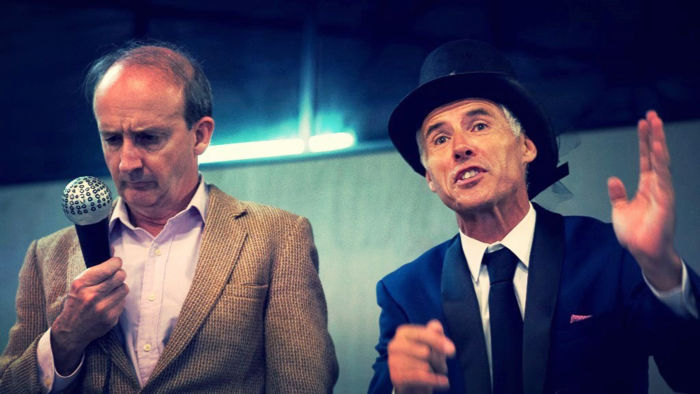Written in 1993 at a time when Canada was in severe recession, the play references the same bewilderment felt now by Australians in 2016 as impersonal economic forces – privatisation, corporatisation and automation – devalue the welfare of the ordinary human being.
Occasional tables planted amongst the audience, and Simon’s bed at the forefront leading into set, quickly connect the audience with the interior world of the play. The jobless Simon (a very funny but anguished Gerry Sont), alarmed by both rising mortgage and unemployment rates, invites the audience to witness a re-enactment of his attempt at “reinsertion into public life”, aided by two friends, Leo (Steve McGrath) and Natalie (Cassady Maddox). Since he cannot find employment, Simon determines to create work by offering original services such as Emotional Stuntsman, Finisher of Sentences (absolutely hilarious), Audience (“I’ll watch your every move and give your life meaning”), Flatterer and Emptiness Eradicator.
Each of his seven forays, designed to cater to his perceived needs and desires of the public, offers immense opportunity for comical exchange but each of them ends in rejection and frustration. Simon’s increasing sense of failure is measured through his choice of a tipple at the day’s end: tea, coffee, light ale and finally whisky from the bottle and a graduated disrobing. The neurotic public, performed by Natalie (managing her array of characters with flair) and Leo (always amusing but especially so as man-with-dog) find Simon intrusive and ridiculous, rejecting his offer to enhance their existence by making them feel as if they have an impact on the world.
The preoccupations of Simon’s two sidekicks while enriching the comic action extend the metaphor. Natalie is obsessed with self-development, taking courses in various parts of the anatomy, prone to offering details about her internal organs at every possible opportunity and eager to show the audience an ultra-sound video. She claims to have seen a mouth in her pancreas ironically taking it as evidence she has “a living being” inside her. Her zaniness reaches its peak in her efforts to sell the audience copies of her video entitled Inside Natalie.
The absurd Leo has an impediment owing to a cortical lesion and is unable to pronounce any word with positive connotations, such as “hopeful” or “good”. Writer of depressing poetry that he tears up, his arbitrary intrusions into the action, with lugubrious expression, ridiculous bodily gestures, and melancholic intoning of the same totally absurd line, he is an extremely funny representation of negativity. Do these friends over whom Simon continually tries to exert control represent entrenched aspects of contemporary society? Or are egocentricity and negativity the companions an often delusionally optimistic and sometimes dodgy Simon deserves?
Finally, it is revealed that the love of “a Natalie in Africa”, motivating Simon to doggedly pursue his plan with an increasingly forced smile at each rejection, is a creation of his own imagination. Simon, it seems, wants to be in love, write letters, moon over photographs but not actually to love. At the beginning of the play Simon is heard to say, “They’ve come to see my life, not yours”, and Leo and Natalie have to struggle to get their five minutes on stage in return for helping Simon. We should note also that Simon has given his re-enactment the structure of the biblical story, accented by Natalie’s accompaniment on guitar, and that he is, after all, a creation of the society the play critiques.
Dynamic direction (Anna Jahjah), excellent acting, clever staging, smooth management (Pauline Evans) and the lovely singing voice of Maddox make 7 Days a truly rewarding theatrical experience. Who does not like to leave the theatre intrigued by the content and still smiling at its absurd humour? An inspired choice by Jahjah as 7 Days so admirably suits our own cold-hearted times.





